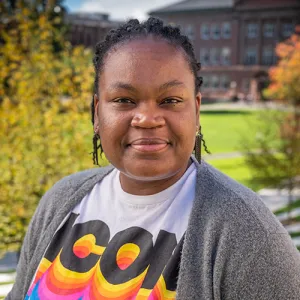Candice R. Price

Bio: My name is Candice Price, and I am currently an associate professor in the department of Mathematics at Smith College in Northampton MA. I was born and raised in California and earned a bachelor’s degree (2003) from California State University, Chico, and a master’s degree (2007) from San Francisco State University, both in mathematics. I earned my doctoral degree (2012) in mathematics from the University of Iowa under the advisement of Isabel Darcy. My area of research is applied mathematics, with an emphasis on mathematical models for biological questions. I also have research interests in math education and problems in the intersection of mathematics and social justice. In my teaching, research, and service, I focus on a collaborative approach and view my work through the lens of inclusion and diversity.
Additional information can be found here.
Topics Include:
Can we make grace the norm in our classrooms?
For much of my life, I was always confused about the way that people perceived the relationship between students and instructors in the classroom, especially in mathematics. There is such an adversarial relationship that even sharing my career choice with strangers leads to groans and stories of trauma. I believe this is what happens in a classroom without grace. So when we add grace the opposite should happen, right? During our time together, I hope to discuss with you the ways that I incorporate grace in my classroom and why many people think it is radical. I invite everyone to come and reflect on ways they can make grace the norm in their classrooms and spaces.
Using Mathematics to Unlock Biological Mysteries
Mathematical modeling is an effective resource for biologists– it provides ways to simplify, study and understand the complex systems common in biology and biochemistry. Many mathematical tools can be applied to biological problems, some traditional and some more novel, all innovative. This presentation will review some of the mathematical tools that I use to study biological questions including knot theory applied to DNA-protein interactions and using social networks to study evolutionary success.
Viewing the World through a Mathematical Lens
The way that numbers interact within the world has fascinated me from an early age. My research path has lead me to work on problems that are essentially about viewing the world through a mathematical lens. While discussing my journey to a career in Mathematics, I will share with you some of my favorite mathematical applications, including but not limited to DNA knotting, fighting parasites and Gerrymandering organs.